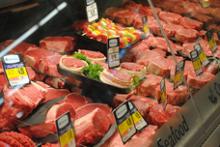The results of this experiment were as predictable as they were depressing.
The bargain supermarket store's chicken was cheaper, but injected to the bursting point with water and artificial flavors. The end result was a bland, chewy bird.
The farmer's market chicken cost twice as much, but produced locally, raised and slaughtered humanely, and turned out absolutely delicious.
The only surprise in this article is that it was a surprise to so many people. It was a surprise to the participants, it was a surprise to many of the article's readers, and it was even a surprise to me. Despite the fact that I should really know better, because I pay pretty close attention to this kind of thing.
Part of what's going on here is that we have become conditioned to think of everything as being equivalent. The $200 television at Walmart is the same as the $500 television at Best Buy. The $5 t-shirt at Target is the same as the $40 t-shirt from American Apparel. A carrot is a carrot is a carrot.
Problem is, it ain't so.
This belief has been drilled into us mainly by large corporations who keep costs low by offshoring the manufacturing of everything they possibly can, producing shoddy merchandise, and cutting all possible corners.
Take Walmart, for example. Walmart exerts a lot of pressure on its suppliers to provide items at a particular price point. In order to make that price point, the suppliers have no choice but to cut corners. Electronics manufacturers, for example, will set up a second production line. They make their regular TVs, and then there's the line where they make their TVs for Walmart. The Walmart production line gets cheaper components, and much less quality control.
You'd better believe the same thing happens in the food department, too.
Low income shoppers are, as you might expect, getting screwed in both directions. If you choose a cheap chicken, you're getting a factory farmed bird that is mostly water, tastes terrible, and is probably far less nutritious. But if you choose a better bird, you're paying twice as much.
And let me tell you something, you do not want to be the person standing in line at Whole Foods using food stamps to buy an $8 chicken. I can't tell you how many times someone has told me, with great outrage, anecdotes about the person they saw at the store paying with food stamps, then loading all those groceries into their Escalade or whatever.
If you are poor, people judge you. Some of them will judge you for buying a cheap, crappy chicken. Others will judge you for buying an expensive, yummy chicken. It ain't fair, but it's how the world works.
Photo credit: Flickr/Anthony Albright
